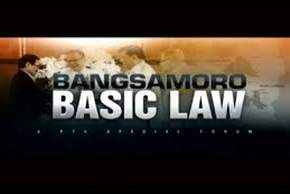 From the Website of MILF
From the Website of MILF
Intergovernmental Relations Body (IGRB) of National Govt and BARMM hold First Consultative Meeting in Davao City
Cotabato City- The national government and Bangsamoro Government
Intergovernmental Relations Body (IGRB) held its First Consultative
Meeting at Marco Polo Hotel, Davao City.
“This is a major step forward in realizing the substantial and functional autonomy envisioned in the Bangsamoro Organic Law,” Finance Secretary Carlos G. Dominguez said as quoted by OPAPP Media Bureau who covered the event Monday, December 16.
The consultative meeting was aimed to, among others, finalize the body’s terms of reference.
Dominguez explained that the (IGRB) provides an institutional mechanism for sustained cooperation and coordination between the agencies established by the Bangsamoro Autonomous Region in Muslim Mindanao or BARMM and those of the national government.”
“It is mandated to coordinate and resolve issues on intergovernmental relations through regular consultations and continuing non-adversarial negotiations,” he added.
According to Dominguez, the IGRB will enable the national and Bangsamoro governments to have “constructive discussions aimed at exploring the best plausible solutions to transform points of differences into points of cooperation.”
“This will ensure that our policies and programs are service-oriented, people-centric, and transformative to bring tangible benefits and real change to the lives of the people in this region,” he said.
Dominguez is optimistic the IGRB would be able to address issues on protocols and procedures, saying, “What is important is that we commence with the work of this vital institutional mechanism” as the body “consolidate[s] the institutions of regional autonomy.”
“This is a historic initiative closely observed by concerned countries all over the world. I am confident that there is enough reserve of goodwill among the collaborating parties to make this initiative a success,” he said.
In Photo- from left to right- BARMM Executive Secretary Abdulrauf Macacua, Finance Sec. Carlos G. Dominguez, and MBHTE Minister Mohagher Iqbal (Photo by OPAPP)
On October 14, 2019, President Rodrigo Roa Duterte approved the recommendation of the Office of the Presidential Adviser on the Peace Process (OPAPP) to establish the IGRB through a memorandum issued by the Office of the Executive Secretary.
As contained in the memorandum, the body was directed by the Chief Executive “to resolve issues brought before it and facilitate the creation of other intergovernmental relations bodies.”
In the OPAPP Site report, IGRB co-chair and BARMM Minister of Basic, Higher, and Technical Education Mohagher Iqbal, underscored the importance of the IGRB, describing the body as an “opportunity-seeking mechanism.”
“While people may generally believe that the IGR is a conflict-prevention mechanism, it is not. I would say in fact that is a wrong notion,” he pointed out.
Iqbal said the body aims to “find opportunities for greater cooperation and coordination between the BARMM and the national government,” as well as “implement the values and the principles of the peace process as enshrined in the Bangsamoro Organic Law.”
He added the IGRB seeks “to find opportunities to create new structures that will respond to the deepest yearnings of the people…This time as [an] attestation to the gains of the peace process between the Philippine Government and the Moro Islamic Liberation Front.”
“Despite the challenges and impediments that are often associated with a highly-political process, both parties managed to agree on significant action points, sign critical documents, and establish the structures to implement the peace agreements,” Iqbal said.
Noting that provisions on intergovernmental relations were “absent” in the previous organic laws for the autonomous region, he said the IGRB “would provide us with the opportunity to decide and agree on matters concerning the implementation of the law.”
“We are thankful to President Rodrigo Roa Duterte for leading us to the path of opportunity so that we can reach the land of peace and prosperity for all – a land where there is justice for all,” Iqbal said.
Meanwhile, Presidential Peace Adviser Carlito G. Galvez Jr said the creation and operationalization of the IGRB will “ensure that concerns involving policy and governance in the implementation of the BOL are acted on promptly and jointly by both parties.”
Galvez emphasized that the launching of the IGRB is both timely and relevant in light of the major gains the Bangsamoro peace process, which includes the ratification of the BOL and the establishment of BARMM, and the start of the decommissioning process.
“This is truly a very historic moment for the Bangsamoro people. All of the milestones we have achieved this year is a testament of the national and Bangsamoro governments’ desire to bring enduring peace and sustainable development to the region,” he said.
“This is a major step forward in realizing the substantial and functional autonomy envisioned in the Bangsamoro Organic Law,” Finance Secretary Carlos G. Dominguez said as quoted by OPAPP Media Bureau who covered the event Monday, December 16.
The consultative meeting was aimed to, among others, finalize the body’s terms of reference.
Dominguez explained that the (IGRB) provides an institutional mechanism for sustained cooperation and coordination between the agencies established by the Bangsamoro Autonomous Region in Muslim Mindanao or BARMM and those of the national government.”
“It is mandated to coordinate and resolve issues on intergovernmental relations through regular consultations and continuing non-adversarial negotiations,” he added.
According to Dominguez, the IGRB will enable the national and Bangsamoro governments to have “constructive discussions aimed at exploring the best plausible solutions to transform points of differences into points of cooperation.”
“This will ensure that our policies and programs are service-oriented, people-centric, and transformative to bring tangible benefits and real change to the lives of the people in this region,” he said.
Dominguez is optimistic the IGRB would be able to address issues on protocols and procedures, saying, “What is important is that we commence with the work of this vital institutional mechanism” as the body “consolidate[s] the institutions of regional autonomy.”
“This is a historic initiative closely observed by concerned countries all over the world. I am confident that there is enough reserve of goodwill among the collaborating parties to make this initiative a success,” he said.
In Photo- from left to right- BARMM Executive Secretary Abdulrauf Macacua, Finance Sec. Carlos G. Dominguez, and MBHTE Minister Mohagher Iqbal (Photo by OPAPP)
On October 14, 2019, President Rodrigo Roa Duterte approved the recommendation of the Office of the Presidential Adviser on the Peace Process (OPAPP) to establish the IGRB through a memorandum issued by the Office of the Executive Secretary.
As contained in the memorandum, the body was directed by the Chief Executive “to resolve issues brought before it and facilitate the creation of other intergovernmental relations bodies.”
In the OPAPP Site report, IGRB co-chair and BARMM Minister of Basic, Higher, and Technical Education Mohagher Iqbal, underscored the importance of the IGRB, describing the body as an “opportunity-seeking mechanism.”
“While people may generally believe that the IGR is a conflict-prevention mechanism, it is not. I would say in fact that is a wrong notion,” he pointed out.
Iqbal said the body aims to “find opportunities for greater cooperation and coordination between the BARMM and the national government,” as well as “implement the values and the principles of the peace process as enshrined in the Bangsamoro Organic Law.”
He added the IGRB seeks “to find opportunities to create new structures that will respond to the deepest yearnings of the people…This time as [an] attestation to the gains of the peace process between the Philippine Government and the Moro Islamic Liberation Front.”
“Despite the challenges and impediments that are often associated with a highly-political process, both parties managed to agree on significant action points, sign critical documents, and establish the structures to implement the peace agreements,” Iqbal said.
Noting that provisions on intergovernmental relations were “absent” in the previous organic laws for the autonomous region, he said the IGRB “would provide us with the opportunity to decide and agree on matters concerning the implementation of the law.”
“We are thankful to President Rodrigo Roa Duterte for leading us to the path of opportunity so that we can reach the land of peace and prosperity for all – a land where there is justice for all,” Iqbal said.
Meanwhile, Presidential Peace Adviser Carlito G. Galvez Jr said the creation and operationalization of the IGRB will “ensure that concerns involving policy and governance in the implementation of the BOL are acted on promptly and jointly by both parties.”
Galvez emphasized that the launching of the IGRB is both timely and relevant in light of the major gains the Bangsamoro peace process, which includes the ratification of the BOL and the establishment of BARMM, and the start of the decommissioning process.
“This is truly a very historic moment for the Bangsamoro people. All of the milestones we have achieved this year is a testament of the national and Bangsamoro governments’ desire to bring enduring peace and sustainable development to the region,” he said.
MILF Website
Article links:
BANGSAMORO FRAMEFORK
OTHER HUMAN RIGHTS PROMOTIONS WEBSITES
PROTECTION AND PROMOTION OF HUMAN RIGHTS
-----------------------------------------------------------------------------------------------
------------------------------------------------------------
-----------------------------
------------------------------------------------------------
-----------------------------







































0 comments:
Post a Comment